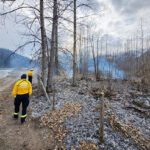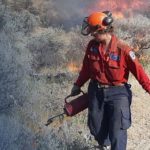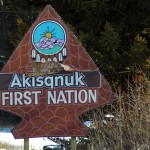Home »

Heating communities with what’s left behind
 A program that helps rural communities turn wood waste into heat for buildings and homes is being expanded throughout the Interior is being managed in Cranbrook by Community Futures East Kootenay.
A program that helps rural communities turn wood waste into heat for buildings and homes is being expanded throughout the Interior is being managed in Cranbrook by Community Futures East Kootenay.
The province is partnering with the Columbia Basin Trust, the Southern Interior Beetle Action Coalition, the Omineca Beetle Action Coalition and the Cariboo-Chilcotin Beetle Action Coalition to invest $240,000 over two years in the Wood Waste 2 Rural Heat project.
Delivered by Community Futures East Kootenay, the bio-energy program works with local governments, First Nations and non-profits to increase the use of local wood waste in efficient and cost-effective heating projects.

“This initiative is like the 100-mile diet, but for energy. We’re bringing biomass heating to the next level in Interior communities by providing resources and information, and bridging the knowledge gap through education, outreach and community engagement,” said Rob Gay, general manager of Community Futures East Kootenay.
Rural British Columbia has a reliable fuel supply of wood waste produced by ecosystem restoration projects, community forests, woodlots and other small tenure holders. Converted into pellets and chips, this woody biomass can power heating projects for smaller communities and businesses, a practice that has been hugely successful in Europe, most notably throughout Austria.
To help rural B.C. communities make the leap to wood biomass heating systems, this expanded project – formerly known as the Green Heat Initiative – will work at the local level to develop business plans that identify technological solutions and financing opportunities.
“The Wood Waste 2 Rural Heat project will grow British Columbia’s bio-energy sector by providing market and industry development assistance to rural communities. The resulting projects will support job creation and provide energy-cost savings to a region that has been hit hard by the mountain pine beetle infestation,” said Pat Bell, Minister of Jobs, Tourism and Skills Training and Minister Responsible for Labour.
Steve Thomson, Minister of Forests, Lands and Natural Resource Operations added, “The economic fundamentals for bio-energy already exist in British Columbia and there has been considerable expansion in the manufacturing of wood pellets and other biomass fuels. This project will help rural communities with the technology research, funding and technical support they need to develop biomass heating systems and use those fuels closer to home.”
The project includes $50,000 from the Ministry of Jobs, Tourism and Skills Training, $60,000 each from the Columbia Basin Trust and the Southern Interior Beetle Action Coalition, and $35,000 each from the Omineca Beetle Action Coalition and the Cariboo-Chilcotin Beetle Action Coalition.
Wood Waste 2 Rural Heat staff will work with First Nations, local governments and organizations to explore the feasibility of new bio-energy projects and develop business plans in these areas: Village of Telkwa; Village of Lumby; District of Clearwater; One project in the Omineca Beetle Action Coalition region; Two projects in the Cariboo-Chilcotin Beetle Action Coalition region; Two projects in the southern East Kootenay; and one project in the West Kootenay.
e-KNOW







